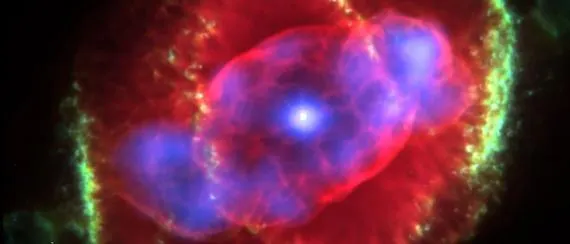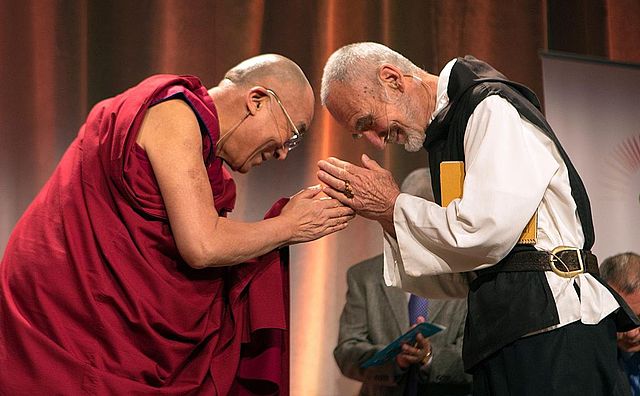I haven’t written about the ‘science vs religion’ thing for ages, but an article caught my attention –– first because I thought it was ridiculous and later because it did force me to think about using scientific metaphors, which is always a positive. It’s The Missing Link: The Coessential Nature of Science and Faith by Nicholas Metrakos, appearing in Orthodoxy Today.
The relationship between science and religion has been debated for centuries and it’s not going to end anytime soon. But what could possibly be left to say about it? As a beginning scientist and Orthodox Christian, I think the debate continues because science is related to religion – especially Christianity — a lot more than we think. We need to study that relationship not only to understand science better but also religion. It will also reveal the paradoxical nature of Orthodox Christianity.
It’s not a big surprise that someone writing for Orthodoxy Today thinks there’s an important relationship between science and religion (especially his religion). What is interesting is that last part. In science, a paradox is generally something to be resolved, or dissolved (as Gary Drescher does pretty well in this book), not celebrated. It’s a major red flag that a paradox is sold as a feature and not a bug. Richard Dawkins may be an asshole but he did once relate a poignant anecdote in Unweaving the Rainbow: “A colleague confessed to an American devotee of post-modernism that she found his book very difficult to understand. ‘Oh, thank you very much,’ he smiled, obviously delighted at the compliment.” This mystery-mongering will come up again later.

Metrakos identifies three camps on the relationship between science and Christianity:
- “atheists who argue science is as far removed from religion as the east is from the west”
- “liberal Christian apologists who attempt to show through simplistic reductions of fundamental theology the two are easily reconciled”
- “hard-line evangelicals who assert that science refutes Christian beliefs and should be discouraged”
He forgot all non-Christian believers, which is telling since a lot of the “science and religion debate” thinkpieces are about switching between a general religion and a specific religion depending on what suits. But otherwise, those 3 camps do describe the ends of a spectrum. At one end, people think religion and science are in harmony, at the other that they’re in conflict (in which case they can differ about which one they consider authoritative).
On the surface all three stances appear unrelated. On closer inspection we see that they all share this assumption in common: that science and religion are discrete entities without shared origin or inherent connection. It creates a kind of Mexican stand-off where each camp has their guns drawn in a conflict where they are actually united in mutually reinforcing ideas.
It’s true that the 3 camps only make sense if science and religion are distinct entities so sure, if engaging in science and religion is in fact the same thing then the question of “science vs religion” would be dissolved. Of course they ARE very distinct activities. Many religious scientists today even place a strong emphasis on the fact that they leave supernatural explanations at the door when engaging in science. The question about whether they’re right to do that is a genuine question, not something to be dissolved.
Like many apologists for the compatibility of science and religion, Metrakos makes a point about them having a shared origin. Now sure, there are plenty of simplistic and just wrong atheist arguments/memes out there about their origins having nothing in common. But beyond correcting this misconception, I think the more relevant reply to talk of origins is “so what?”. Yes, historically a lot of people who engaged in science were religious. And yes, religious institutions have played a role in the history of the development of scientific ideas (for better or worse). But this doesn’t mean the ways of thinking are compatible. The fact is that these are two very different kinds of thinking which is why it’s possible for a religious scientist to “check their religion at the door”.
Metrakos then argues that we need [contra-causal] free will to do science.
From Genesis we learn that God in His infinite wisdom and love for us His lowly creatures gave us the gift of free will. This ability to choose is extraordinarily powerful and is chief among our traits which delineates us from all other animal life. Furthermore, this free will gives rise to the idea that as humans we have the ability to selectively modulate physical objects and to observe some subsequent effect.
This is the basis of empirical science: manipulation of some independent variable and measurement of some response in a dependent variable. We are also able to create mathematical equations of the relationship between these two variables, giving us some ability to describe a phenomenon. With this logic it is reasonable to say that the gift of free will gives rise to the fundamental principle of empiricism. This is the link between the two entities which are commonly discretized.
Let’s leave alone that there’s a lot more to science than manipulating an independent variable and checking your measuring instrument to see how a dependent variable changes. (If that’s all there was to it, we should consider the mountains of evidence that smoking causes lung cancer to be pseudoscience.) So for our purposes, science is manipulating variables, recording results and coming up with formulas to describe laws. Do we need to be “free” in the contra-causal sense to do this? The answer’s a clear no. You could write a program that follows this process pretty well (and they exist too). I doubt that Metrakos would think that the program has free will endowed by a god but it is as sciency as a that stereotypical dead white male in a lab coat doing the same thing. Ironically, it is engaging in science that gives evidence against a contra-causal free will, because science requires a strong commitment to causes which leave no room for the theological kind of free will.
Metrakos then states that most examples by Christian scientists of when science gives them religious inspiration “are often trivial examples of God’s fingerprint”. And sure, if I were religious I would still find something like this video about how amazing it is that the protein Laminin is rolled into a cross-like shape laughable.

Instead he looks at three cases where science provides useful analogies to explain theological questions. These are:
- The fact that each member of the Church composes the Church and is composed of the Church is like the fact that each cell composes the body while containing the DNA with the genetic “recipe” for making the whole body.
- The fact that Christ is fully human and fully divine is like the fact that in light has a wave-particle duality, with full properties of both a wave and a particle.
- The fact that God’s kingdom is beyond time and space and can be experienced in the human “now” is like the fact that an infinite-dimensional hypercube can be projected into a 3-dimensional universe for us to experience as a cube.
When I first read these I LOLed, as it sounds even more ridiculous than the automatic Choprawoo generator. But to be clear, he’s not saying that these 3 pieces of scientific theory provide evidence for those 3 religious beliefs. He’s saying that these 3 scientific theories provide a good metaphor to understanding these 3 religious beliefs.
But even this way of using metaphors is problematic. They’re meant to shed light on those parts of his theology that Metrakos considers as difficulties or apparent contradictions. So it would be natural that he would use those parts of science that seem to give rise to apparent contradictions in our understanding, like the wave-particle duality of quantum mechanics. But those parts of science could be used as a metaphor for any apparent contradiction in any religion. He’s using wave-particle duality as a generic get-out-of-contradictions card.
The other important problem is that none of these scientific analogies are actual contradictions; they’re full-blown theories. For wave-particle duality, the theory doesn’t actually say (as far as I know) that (eg.) a proton is both a particle and a wave at the same time. It uses a mathematical apparats that predicts some particle-like behaviour in some situations and wave-like behaviour in others. How we interpret that is up to us, and there’s a huge field of quantum mechanics interpretation. But no matter which interpretation we take, the results are unambiguous. Whereas when the principle is used for theology, someone would just be picking whichever part of the apparent contradiction (eg. is Christ human or divine) that suits the context.
Finally, the mystery-mongering is pretty pernicious when these analogies are used. Here’s Metrakos on the DNA analogy:
What a great and marvelous mystery! The body of Christ is composed of units which contain that which they compose as do our physical bodies made in Christ’s image and likeness. Without studying science and its discoveries a deeper understanding of this revelation is lost to mankind.
So for theology it’s a great mystery and something to be celebrated. But the actual science isn’t a mystery at all. There are things we don’t know about DNA and cells but the basic process is well-understood, or there wouldn’t be a clear and precise analogy to shoehorn into theology. So again the science gets diluted and twisted, but with the added effect of undermining the state of science because it’s making it out that just like the nature of Christ, cells are ultimately a “mystery”.
The discoveries of science give us a rich library of metaphors that we often can’t help but use for our non-scientific interests (religious, political or ideological). I don’t think this is intrinsically bad, but much of the time these misrepresent and dilute the science. Hopefully next time we’re about to use such an analogy we’d want to be especially careful so it’s not a case of shoehorning like for Metrakos.





0 Comments